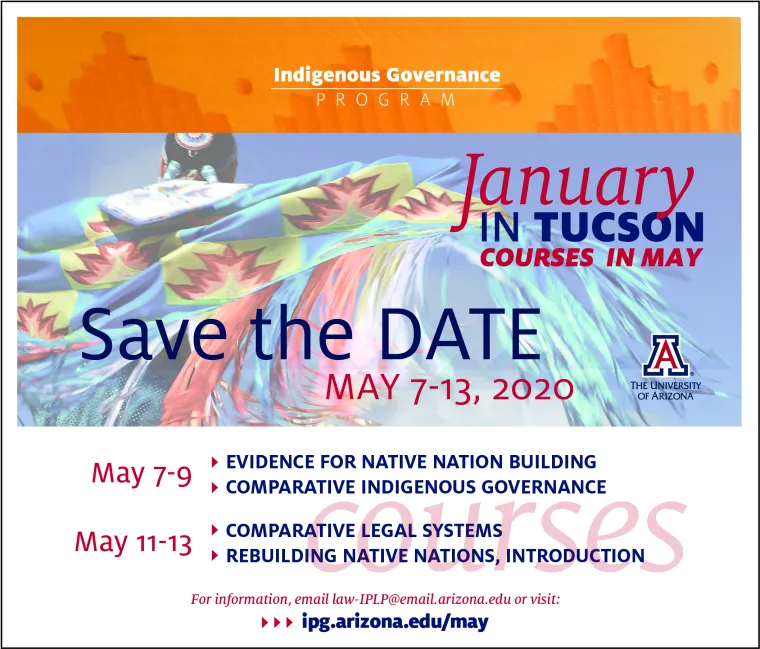
Due to popular demand, we are offering four January in Tucson Courses in May 2020! The course format and experience for May courses will be the same as January courses: each course meets for 4.5 hours for 3 consecutive days. Due to the intensity of the program, please register by April 30 to gain access to course materials prior to the first day of class.
"January in Tucson has offered a lot of insight into how other tribal communities have dealt with issues... how tribes have pursued their identity and demonstrated self-determination. The next step is trying to see if we can make those efforts in our community too."
Mikhail Sundust (Gila River), Acting Managing Editor, Gila River Indian News | JIT 2016
The Evidence for Native Nation Building (May 7-9, 8 AM-12:20 PM)
Supported by three decades of research, Indigenous self-determination and tribal self-governance have proven to be the most effective policies when it comes to addressing economic disparities affecting Indigenous communities and empowering tribal governments to exercise real control over their cultures, lives, and societies.
KEY QUESTIONS:
- What specific data support the core principles of Indigenous nation building (self-determination, effective and legitimate governing institutions, strategic orientation, and public-spirited leadership)?
- What is the basis of the argument that Indigenous self-determination and self-government are the most effective nation rebuilding policies?
- How can course participants contextualize the Indigenous research findings for their own communities?
Comparative Indigenous Governance (May 7-9, 1:30 PM - 5:50 PM)
Across the globe, Indigenous peoples are engaged in the work of Indigenous governance regardless of whether they use that term or not. This course will examine different systems of Indigenous governance with an emphasis on Indigenous peoples living in Canada, Australia, New Zealand, and the United States.
While these four countries share certain features, like English legal and political heritages, they also differ in important ways. Those differences have affected the patterns, and outcomes of Indigenous self-determination and self-government efforts. Three questions form the subject matter of this course:
- What are the commonalities/differences among these four countries and their impacts on Indigenous assertions of self-governing power?
- How and why do the patterns of Indigenous self-government vary across these four countries?
- What, if anything, might Indigenous peoples learn from each other across these countries as they assert and implement rights of self-government?
Comparative Legal Systems and Their Role In Nation Building (May 11-13, 8 AM-12:20 PM)
The course will investigate the role that law plays in the lives of Indigenous peoples and in their on-going efforts to secure their rights of equality, tribal self-governance, and self-determination. The course draws from comparative sources with a focus on how law can be used pragmatically by Indigenous leaders, communities, their partners and advocates to effect meaningful change.
KEY QUESTIONS:
- How does law function to perpetuate a history of assimilation and racism within governmental institutions around the world?
- How can Indigenous peoples use law to secure rights and exercise tribal self-governance?
- What role can legal institutions play in the processes of Indigenous nation building?
*Registration in this course may qualify for up to 12 hours of CLE credit for State Bar of Arizona members, including 0 hour(s) of professional responsibility. The State Bar of Arizona does not approve or accredit CLE activities for the Mandatory Continuing Legal Education requirement. Contact the State Bar of Arizona for more details. For details on CLE eligibility outside of Arizona, please contact your State Bar Association.
Rebuilding Native Nations: An Introduction (May 11-13, 1:30 PM - 5:50 PM)
This course examines the development challenges faced by contemporary Native nations. Utilizing numerous case studies and extensive research on what is working and what is not working to promote the social, political, cultural and economic strengthening of American Indian nations, the course emphasizes themes applicable to community development and nation rebuilding worldwide. Historical and relevant federal Indian policy and case law are used as background material, but the course emphasizes the interdisciplinary nature of the “nation building revolution” underway in Indian Country. Additional emphasis is placed on how tribal initiatives can conflict with federal case law, state jurisdiction, and federal policies and politics.
KEY QUESTIONS:
- What is working, and what is not working, to promote the social, political, cultural and economic strengthening of Native nations and Indigenous governance?
- While the primary focus of the course is on the American Indian experience, what principles of nation building are applicable to Indigenous peoples worldwide?
- In what ways have American Indian policy and case law promoted and impeded tribal self-governance?
- What conflicts between federal, state, and local governments can arise from tribal assertions of self-governance?
